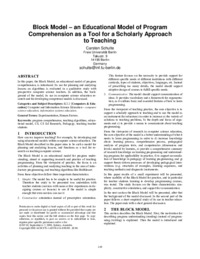Block Modelan educational model of program comprehension as a tool for a scholarly approach to teaching
Publikationsdatum:
Zu finden in: ICER 2008 (Seite 149 bis 160), 2008
|
 |
 Diese Seite wurde seit 1 Jahr inhaltlich nicht mehr aktualisiert.
Unter Umständen ist sie nicht mehr aktuell.
Diese Seite wurde seit 1 Jahr inhaltlich nicht mehr aktualisiert.
Unter Umständen ist sie nicht mehr aktuell.
 Zusammenfassungen
Zusammenfassungen

In this paper, the Block Model, an educational model of program comprehension, is introduced. Its use for planning and analyzing lessons on algorithms is evaluated in a qualitative study with prospective computer science teachers. In addition, the background of the model, its use in computer science education research and for developing competence models is discussed.
 Dieses Konferenz-Paper erwähnt ...
Dieses Konferenz-Paper erwähnt ...
 Zitationsgraph
Zitationsgraph
 Zitationsgraph (Beta-Test mit vis.js)
Zitationsgraph (Beta-Test mit vis.js)
 9 Erwähnungen
9 Erwähnungen 
- Koli Calling 2013 - 13th Koli Calling International Conference on Computing Education Research, Koli Calling '13, Koli, Finland, November 14-17, 2013 (Mikko-Jussi Laakso, Simon) (2013)
- The use of code reading in teaching programming (Teresa Busjahn, Carsten Schulte) (2013)


- The use of code reading in teaching programming (Teresa Busjahn, Carsten Schulte) (2013)
- ICER 2015 - Proceedings of the eleventh annual International Conference on International Computing Education Research, ICER 2015, Omaha, NE, USA, August 09 - 13, (Brian Dorn, Judy Sheard, Quintin I. Cutts) (2015)
- Fourth Grade Students Reading Block-Based Programs - Predictions, Visual Cues, and Affordances (Hilary A. Dwyer, Charlotte Hill, Alexandria K. Hansen, Ashley Iveland, Diana Franklin, Danielle Harlow) (2015)


- Fourth Grade Students Reading Block-Based Programs - Predictions, Visual Cues, and Affordances (Hilary A. Dwyer, Charlotte Hill, Alexandria K. Hansen, Ashley Iveland, Diana Franklin, Danielle Harlow) (2015)
- ICER 2018 - Proceedings of the 2018 ACM Conference on International Computing Education Research, ICER 2018, Espoo, Finland, August 13-15, 2018 (Lauri Malmi, Ari Korhonen, Robert McCartney, Andrew Petersen) (2018)
- Investigating the Relationship Between Spatial Skills and Computer Science (Jack Parkinson, Quintin I. Cutts) (2018)


- Investigating the Relationship Between Spatial Skills and Computer Science (Jack Parkinson, Quintin I. Cutts) (2018)
- If They Build It, Will They Understand It? - Exploring the Relationship between Student Code and Performance (Jean Salac, Diana Franklin) (2020)


- ICER 2020 - International Computing Education Research Conference, Virtual Event, New Zealand, August 10-12, 2020 (Anthony V. Robins, Adon Moskal, Amy J. Ko, Renée McCauley) (2020)
- Hedy - A Gradual Language for Programming Education (Felienne Hermans) (2020)


- Syntax Exercises in CS1 (John Edwards, Joseph Ditton, Dragan Trninic, Hillary Swanson, Shelsey Sullivan, Chad D. Mano) (2020)


- Understanding Conceptual Transfer for Students Learning New Programming Languages (Ethel Tshukudu, Quintin I. Cutts) (2020)


- Hedy - A Gradual Language for Programming Education (Felienne Hermans) (2020)
- WiPSCE '20 - Workshop in Primary and Secondary Computing Education, Virtual Event, Germany, October 28-30, 2020 (Torsten Brinda, Michal Armoni) (2020)
- High-school students' mastery of basic flow-control constructs through the lens of reversibility (Claudio Mirolo, Cruz Izu, Emanuele Scapin) (2020)


- High-school students' mastery of basic flow-control constructs through the lens of reversibility (Claudio Mirolo, Cruz Izu, Emanuele Scapin) (2020)
- Informatics in Schools. Beyond Bits and Bytes: Nurturing Informatics Intelligence in Education - 16th International Conference on Informatics in Schools: Situation, Evolution, and Perspectives, ISSEP 2023, Lausanne, Switzerland, October 23–25, 2023 (Jean-Philippe Pellet, Gabriel Parriaux) (2023)


- Combining Models to Orchestrate an Instructional Scenario Fostering Computational Thinking in Educational Robotics (Frankie Dubois, Stephanie Burton, Patrick Wang, Morgane Chevalier)


- Combining Models to Orchestrate an Instructional Scenario Fostering Computational Thinking in Educational Robotics (Frankie Dubois, Stephanie Burton, Patrick Wang, Morgane Chevalier)
 Anderswo finden
Anderswo finden
 Volltext dieses Dokuments
Volltext dieses Dokuments
 |  Block Model: Fulltext at the ACM Digital Library ( Block Model: Fulltext at the ACM Digital Library ( : :  , 304 kByte; , 304 kByte;  : :  Link unterbrochen? Letzte Überprüfung: 2020-11-28 Letzte erfolgreiche Überprüfung: 2020-05-28) Link unterbrochen? Letzte Überprüfung: 2020-11-28 Letzte erfolgreiche Überprüfung: 2020-05-28) |
 Anderswo suchen
Anderswo suchen 
 Beat und dieses Konferenz-Paper
Beat und dieses Konferenz-Paper
Beat hat Dieses Konferenz-Paper während seiner Zeit am Institut für Medien und Schule (IMS) ins Biblionetz aufgenommen. Beat besitzt kein physisches, aber ein digitales Exemplar. Eine digitale Version ist auf dem Internet verfügbar (s.o.). Aufgrund der wenigen Einträge im Biblionetz scheint er es nicht wirklich gelesen zu haben. Es gibt bisher auch nur wenige Objekte im Biblionetz, die dieses Werk zitieren.











 Biblionetz-History
Biblionetz-History